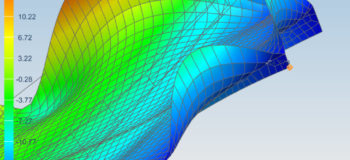Monte Carlo Simulation for Robust Products


Monte Carlo simulation helps you understand what parts of a product will be sensitive to these environmental changes, so you can adjust the part(s) accordingly. Just what is Monte Carlo, you ask. It is a forecast model that accounts for uncertainty in quantitative analysis and gives you a range of possible outcomes.
How it works is Monte Carlo replaces each uncertain factor with a range of values—a probability distribution. The simulation then randomly samples the values from the probability distribution, calculates the model, records the result, and repeats the process multiple times to get broad coverage of the design space.
Running a large number of simulations can be expensive. That’s where NX Nastran and Rescale come in. You get unlimited access to resources on the cloud, and the pay-per-use Software as a Service (SaaS) model makes large-scale simulation more cost-effective. Furthermore, design of experiments (DOE) runs are discounted, so they are even more cost-effective.
Let’s look at an example of when you would use this method:
You’re given a model of a satellite dish on which you have to perform analysis. The dish requires a certain curvature to properly transmit a signal. It will be outside, exposed to the elements, and so will incur a certain amount of deformation. You have to determine what amount of deformation the dish can sustain and still be able to transmit the signal.
Using NX CAE and NX Nastran on Rescale, you perform a Monte Carlo simulation on this model and obtain a range of results. You easily compare the variation in displacement between one point and another, so you know what areas you need to focus on to improve the satellite dish’s performance.
Here is what those results would look like:
Have you used Monte Carlo simulation before? Let us know your thoughts in the comments below.




